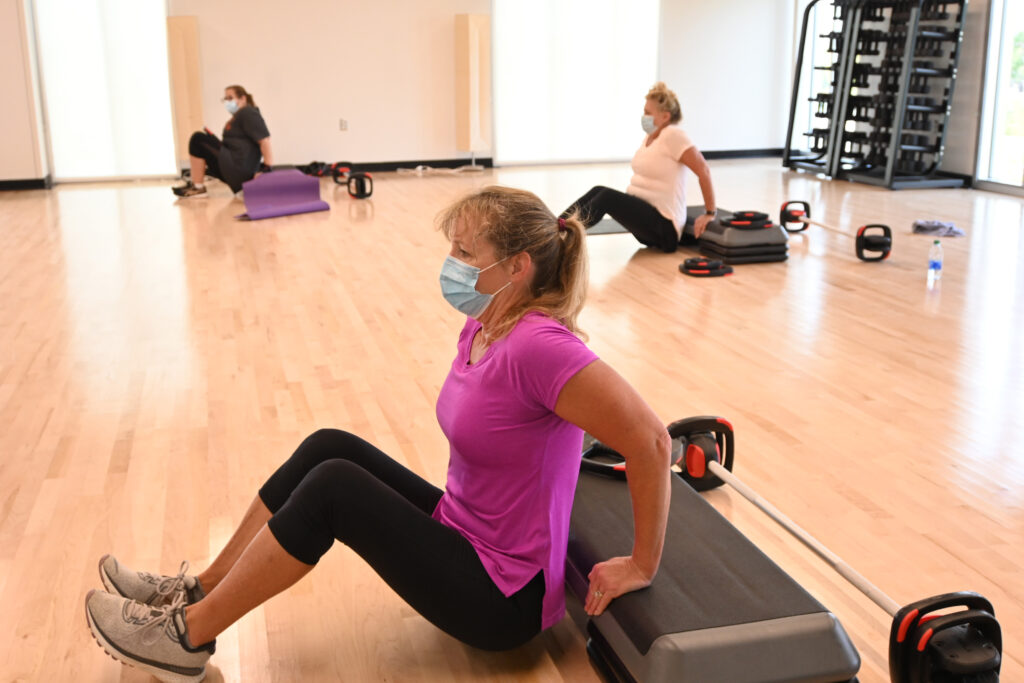
We get it. Wearing a mask isn’t the most enjoyable thing to be doing right now. However, it is the safest, and at the Y our members’ health and safety are our top priority. So how can you be more comfortable while exercising in a mask?
Check out these 4 tips from our friends at the Greater Brandywine YMCA to help adjust to working out with a mask.
Focus on Your Breath
Undoubtedly, wearing a mask during exercise takes some getting used to. One way to adjust is by focusing on your breath during a workout says Jackie Canan, senior director of group exercise and virtual delivery for the YMCA of Greater Brandywine (YGBW).
“Take deeper, slower inhales through the nose as well as slower exhales – almost as if you’re training for running. This will prevent you from getting light headed and make your workout more successful.”
Breathing through your nose will also decrease the amount of moisture that accumulates on the mask.
Pro Tip: Consider taking our Pilates classes, which incorporate breath work into the workout.
Find the Right Mask
There are a variety of masks already on the market – paper, cotton, synthetic and even plastic. Remember, the mask is going to get damp or even wet depending on the intensity of your workout. Because of this, it’s a good idea to bring two or more masks to work out so that you can swap them when one is too saturated. You’ll notice our instructors swapping theirs out during high-intensity classes.
Most major sporting retailers have begun selling masks that are designed specifically for exercising. You’ll want to choose a mask that is snug around your face and made from a tightly woven, breathable fabric. Some experts suggest choosing a mask made from a synthetic fabric such as polyester due to its breathability. And remember to wash your mask after every use.
Reap the Benefits
While exercising with a mask can be uncomfortable, there are some benefits, according to experts.
When your face is covered during exercise your lungs have to work harder to get the same amount of air into the lungs. Over time, this can strengthen your respiratory system including your lungs and diaphragm. And when it’s safe to exercise without a mask your lungs will be able to absorb more oxygen, which can result in a performance increase.
Know Your Limits
Chrissy Shiring, senior wellness director, suggests decreasing your intensity level when first exercising with a mask.
“Do not expect to be able to perform at the same level you would without a mask. Expect to fatigue faster.”
But your body will adjust.
“The first time exercising with a mask is going to be the most challenging,” says Canan. “Each time it gets a little bit easier. Don’t give up on yourself. Taking breaks is ok, have some grace with yourself.”
YMCA member Hayley Leocha has been wearing a mask in group exercise classes for a few weeks now and agrees that it gets easier.
“At first, working out with a mask was more than uncomfortable. I felt claustrophobic. As I stuck with it though, I found that changing my breathing and mental mindset was critical. Each workout and each week is a journey toward retraining my mind and body.”
Remember that our instructors are here for you. Don’t be afraid to ask an instructor to show you breathing techniques or to modify movements for lower impact.
“The best tip I can give members is to be kind to yourself and give yourself permission to pull back,” recommends Shiring. “This is new to all of us and our bodies.”